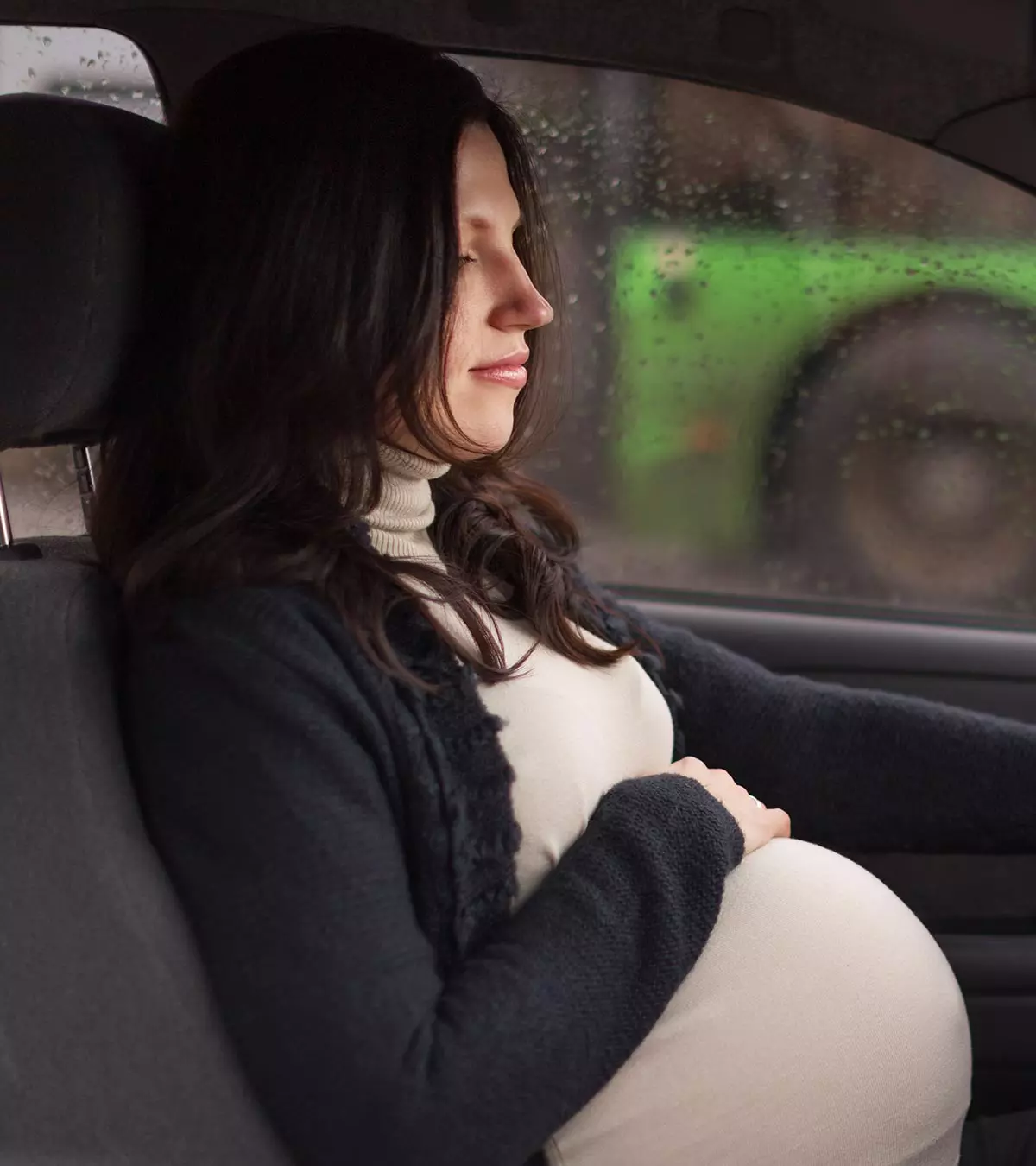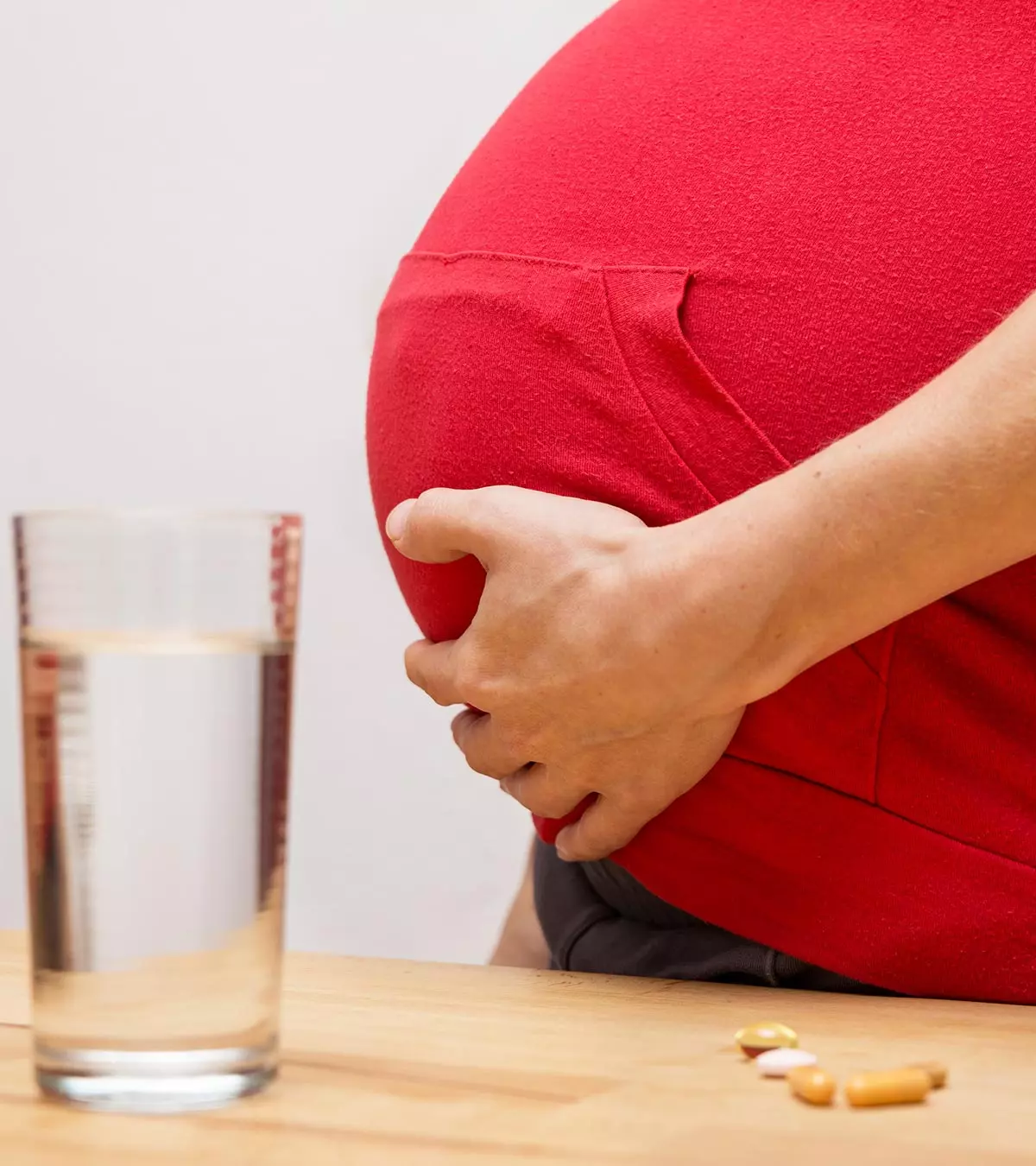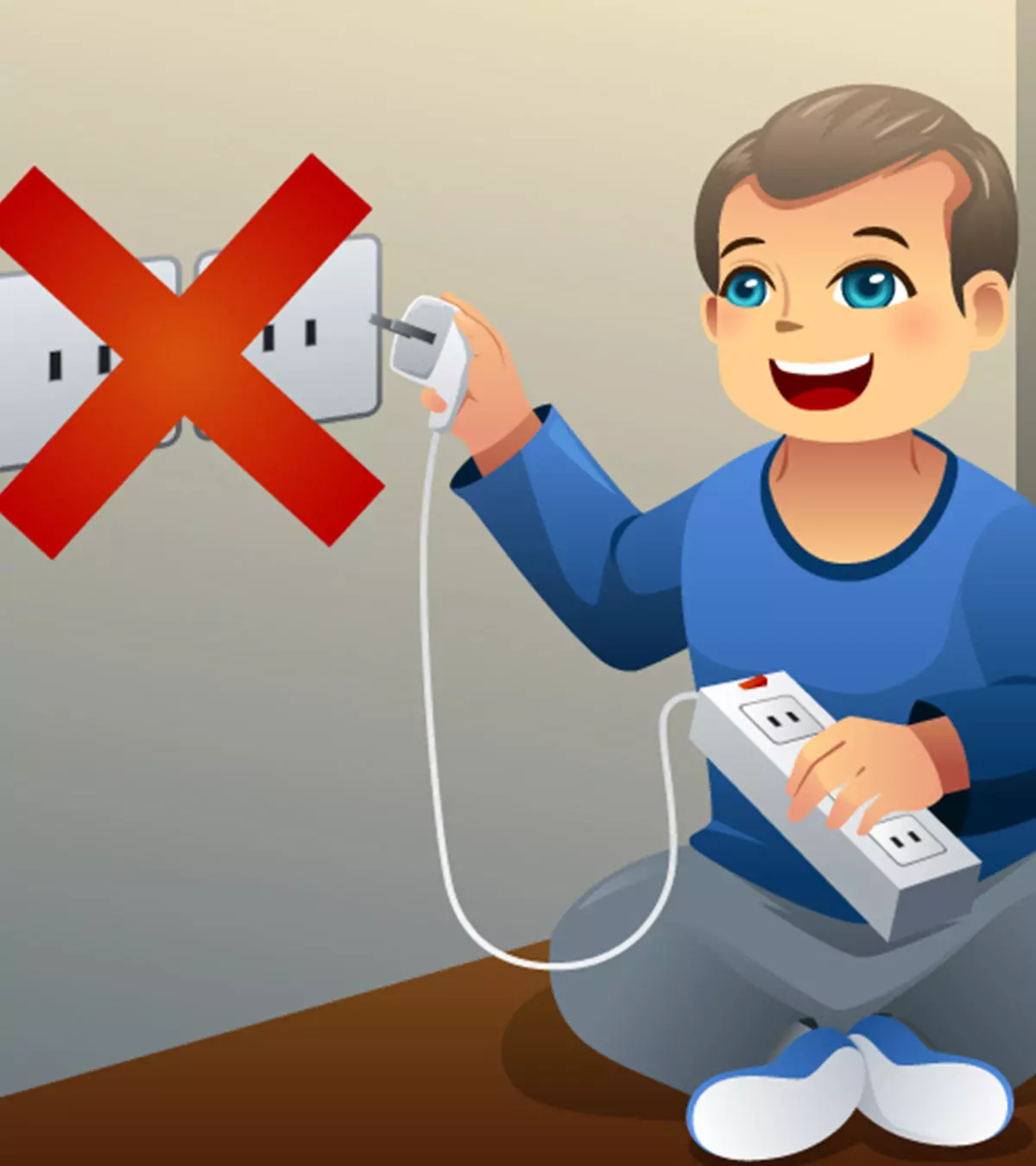
Image: Shutterstock
Motion sickness or travel sickness refers to the queasiness or dizziness associated with traveling by train, car (car sickness), boat (sea sickness), or plane (air sickness). This pregnancy sickness may be caused due to the hormonal changes that occur during this period. And for those who generally encounter motion sickness, pregnancy may aggravate the condition.

Keep reading this post as we tell you the causes, risk factors, symptoms, and diagnosis of motion sickness in pregnant women. We also share some tips to prevent or alleviate unease.
Key Pointers
- Pregnancy-related hormonal changes can cause motion sickness, resulting in nausea or dizziness while traveling.
- Other factors such as a heavy stomach, polluted air, and sensory confusion can also contribute to travel sickness.
- Symptoms of motion sickness in pregnancy may include sweating, dehydration, excessive salivation, headache, and discomfort.
- Medical treatment may be prescribed based on the severity of the condition, mainly targeting nausea and vomiting.
- Management of motion sickness during pregnancy can be done through proper hydration, avoiding heavy meals, and breathing fresh air.
What Causes Motion Sickness During Pregnancy?

You are likely to have motion sickness when you travel long distances. Also, it may be aggravated by various other factors during pregnancy. like some food, any particular smell etc.
- Conflicting signals sent by your senses: Your brain senses movements with the help of signals sent by different parts of the body—your eyes, inner ears, muscles, and joints. During travel, it is probable that the sensory organs will transmit conflicting sensory input to the brain, leading to the possibility of experiencing motion sickness (1). For instance, when you are on a plane, your inner ear can sense motion, but your eyes cannot. Or, when you are in a car, your eyes can sense motion, whereas your inner ear and muscle joints cannot.
- Heavy stomach: When you travel right after a heavy meal, the up and down motion of the body may disrupt digestion, leading to motion sickness (2).
- Polluted air: If you are traveling in an area that has smoky or stuffy air, it could make breathing difficult. Therefore, you may experience nausea and lightheadedness.
- Sometimes a particular type of food or smell also triggers motion sensitivity.
Factors That Increase The Possibility Of Motion Sickness

Some factors that are likely to aggravate motion sickness during pregnancy include (3):
- Not getting enough air while traveling
- Traveling in smoky regions
- Reading while traveling
- Amusement rides
- Virtual reality experiences
Symptoms Of Motion Sickness During Pregnancy

Pregnant women suffering from motion sickness are likely to have some or all of the following symptoms (4):
- Dehydration due to continuous vomiting
- Sweating
- Excessive salivation
- Increased sensitivity to odors
- Apathy
- Rapid breathing
- Loss of appetite
- Headache
- Drowsiness
- Malaise (general discomfort) and pallor (pale skin)
- Warm sensation
An astronomy blogger and a mother of two children, shares about her motion sickness during her second pregnancy. She writes, “I have suffered from what most people would call minor morning sickness for most of the first trimester. The first time around this started around week 7 and went on until week 14 or so, and comprised mostly severe sensitivity to smells (no malls, grocery stores, or takeout were possible, and walking down the street was exciting!), constant mild nausea, increased motion sickness, and vomiting 3-4 mornings every week (for 7 weeks!) (i).”
 Quick fact
Quick factDiagnosis Of Motion Sickness
Motion sickness is usually mild and resolves itself.
You will most likely experience it while you are traveling, and the illness may subside as the motion ceases.
You may need medical attention if the condition persists. Your doctor will find out the cause of the problem (if you have traveled by car, boat, or plane) and ask about the symptoms you are experiencing. Based on the severity, medications are prescribed to help manage the condition.
Treatment For Motion Sickness During Pregnancy
Your doctor usually prescribes antiemetic medication that works for nausea and vomiting (morning sickness). They might ask you to take them before traveling to prevent motion sickness.
- Doxylamine is given in combination with pyridoxine (vitamin B6) to treat nausea and vomiting (5). These medications are absolutely safe in pregnancy and are categorized as FDA category B.
- Meclizine and dimenhydrinate are antihistamines that are useful in preventing and treating motion sickness (6). These are FDA category C drugs.
Tips For Dealing With Motion Sickness

Here are some simple relaxation techniques that may help if the motion sickness does not resolve or if the symptoms persist.
- If possible, rest by closing your eyes and taking a nap. Take deep breaths or focus on an object.
- Gaze at a stable object, or simply look out of the window.
- Breathe in fresh air and try to avoid smoke-filled areas.
- Ginger is found to be effective for motion sickness (7). It is available in the form of supplements too.
- Acupressure and the stimulation of the P6 point on the anterior wrist may also help ease nausea (8).
Preventing Motion Sickness During Pregnancy

If you are prone to motion sickness during pregnancy, the following measures could help in preventing it (8).
- Sit in a position such that your eyes can see the same motion as felt by your body and inner ears.
- In a car, sit in the front seat; on a boat, watch the horizon; in a plane, choose a window seat and look outside; and while traveling on a bus, train, or tram, face forward.
- Avoid heavy meals or fatty snacks before traveling.
- Do not read while traveling.
- Do not talk or watch another traveler who is experiencing motion sickness.
- Avoid smells that upset your stomach.
- Drink plenty of fluids.
 Quick tip
Quick tipFrequently Asked Questions
1. How long does motion sickness last during pregnancy?
Symptoms of motion sickness typically go away when the motion ceases. But this may not always be the case. In some cases, they may last for a few hours or even days after your travel during pregnancy.
2. Is motion sickness a sign of pregnancy?
Motion sickness is not likely to be a sign of pregnancy.
3. Does pregnancy make motion sickness worse?
Pregnancy may not make you prone to motion sickness. But if you have morning sickness, traveling can make it worse
(3).
4. Can you get motion sickness from the baby’s movements?
Baby movements are not related to motion sickness. You may feel sensations of a kick, roll, swish, or flutter, which do not cause nausea and vomiting.
5. Is motion sickness psychological?
Motion sickness is primarily physiological. However, some evidence suggests that psychological factors, such as memories of previous motion discomfort and their effects on future encounters, may also play a role (9) (10).
6. Can anxiety cause motion sickness?
Yes, anxiety can trigger motion sickness. When an individual gets anxious, the stress hormones in the body increase, which can disturb the equilibrium and balance of the inner ear and mind and cause motion sickness. Additionally, anxiety can make an individual more conscious of their body sensations, making the feeling of motion sickness more pronounced (11).
7. Can being tired cause motion sickness?
Sleep deprivation has been found to increase an individual’s susceptibility to motion sickness (11), which suggests a link to fatigue. However, it is essential to note that not every tired individual will experience motion sickness.
While motion sickness is linked with travel, certain factors, including hormonal changes, certain foods or smells, a heavy stomach, and pollution, can also cause motion sickness during pregnancy. If you’ve had motion sickness before pregnancy, it may worsen during pregnancy. While the condition is usually mild and heals by itself, seek medical help if the motion sickness persists or the symptoms become severe. Take naps, breathe fresh air, and consume ginger, among other things, to help alleviate the discomfort. Avoiding reading and drinking enough fluids could also help.
Infographic: Tips On Dealing With Motion Sickness In Pregnancy
While pregnant, you may often feel nauseous when traveling in a moving vehicle; nonetheless, you may try simple methods to relieve these symptoms. So, scroll through this infographic to discover the helpful ways to handle motion sickness during pregnancy.
Some thing wrong with infographic shortcode. please verify shortcode syntax
Illustration: Motion Sickness In Pregnancy: Causes And Remedies

Image: Stable Diffusion/MomJunction Design Team
Personal Experience: Source
MomJunction articles include first-hand experiences to provide you with better insights through real-life narratives. Here are the sources of personal accounts referenced in this article.
i. A minor inconvenience of early pregnancy;https://astronomom.blogspot.com/2009/12/
References
- Motion Sickness; U.S. Department of Health and Human Services National Institutes of Health
https://medlineplus.gov/motionsickness.html - Motion Sickness – A Doctor’s Advice; The Open University
https://www.open.edu/openlearn/theme/openlearnng/hidecourse.php?viewmod=0 - Motion Sickness; Cleveland Clinic
https://my.clevelandclinic.org/health/diseases/12782-motion-sickness - Motion Sickness; CDC
https://wwwnc.cdc.gov/travel/yellowbook/2025/air-land-sea/motion-sickness - Doxylamine and Pyridoxine; U.S. Department of Health and Human Services National Institutes of Health
https://medlineplus.gov/druginfo/meds/a613045.html - Veronica Takov and Prasanna Tadi; Motion Sickness; StatPearls Publishing (2025).
https://www.ncbi.nlm.nih.gov/books/NBK539706/ - Iñaki Lete and José Allué; The Effectiveness of Ginger in the Prevention of Nausea and Vomiting during Pregnancy and Chemotherapy; Integrative Medicine Insights (2016).
https://www.ncbi.nlm.nih.gov/pmc/articles/PMC4818021/#__ffn_sectitle - Andrew Brainard and Chip Gresham; Prevention and Treatment of Motion Sickness; American Family Physicians (2014).
https://www.aafp.org/pubs/afp/issues/2014/0701/p41.html - Andreas Koch et al.; The Neurophysiology and Treatment of Motion Sickness (2018); NCBI
https://www.ncbi.nlm.nih.gov/pmc/articles/PMC6241144/ - Thomas G. Dobie; Psychological Mechanisms That Exacerbate Motion Sickness (2019); Motion Sickness
https://idp.springer.com/authorize?response_type=cookie&client_id=springerlink&redirect_uri=https%3A%2F%2Flink.springer.com%2Fchapter%2F10.1007%2F978-3-319-97493-4_6 - James R. Lackner; Motion sickness: more than nausea and vomiting (2014); NCBI.
https://www.ncbi.nlm.nih.gov/pmc/articles/PMC4112051/#
Community Experiences
Join the conversation and become a part of our nurturing community! Share your stories, experiences, and insights to connect with fellow parents.
Read full bio of Dr. Rana Choudhary (Khan)
Read full bio of Rebecca Malachi
Read full bio of Swati Patwal
Read full bio of Aneesha Amonz
















